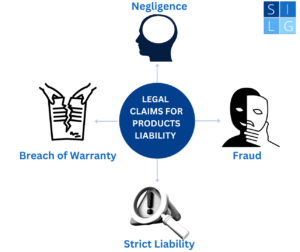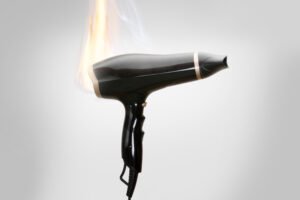Here in Nevada, “product liability” refers to the legal responsibility of manufacturers, distributors, and retailers to ensure that the products they produce and sell are safe and free from defects that could harm consumers. If you get injured by a defective or dangerous product, you may have grounds to file a lawsuit seeking compensation for your losses.
Here are five key things to know about product liability lawsuits in Nevada:
- Common product liability claims are negligence, strict liability, breach of warranty, and intentional misrepresentation or fraud.
- You can sue the product manufacturer, distributors, wholesalers, or retailers that were involved.
- Typical compensatory damages include medical expenses, lost wages and lost earning capacity, and pain and suffering.
- You may get punitive damages if the defendant acted with oppression, fraud, or malice.
- The statute of limitations in product liability cases is typically four years after the injury.

Our Nevada personal injury lawyers handle both individual and class action lawsuits in Nevada and federal court on your behalf if you have been injured by dangerous or mislabeled products.
To help you learn more about Nevada products liability law, our Las Vegas personal injury attorneys discuss the following:
- 1. How do I prove products liability in Nevada?
- 2. What is breach of warranty?
- 3. What is strict liability?
- 4. What is negligence?
- 5. What is intentional misrepresentation or fraud?
- 6. Can I get punitive damages in a Nevada products liability case?
- Additional reading
1. How do I prove products liability in Nevada?
Nevada law recognizes four common theories of product liability. In many cases, you can look to more than just one theory when making a claim for being injured by a dangerous product. The four legal theories are:
- Breach of warranty,
- Strict liability,
- Negligence, and
- Intentional misrepresentation or fraud.
These bases for products liability claims can often be brought against more than one party – for instance,
- the manufacturer,
- a regional distributor, and
- a seller.

There are many possible defendants in a products liability case.
2. What is breach of warranty?
Often a product will come with some type of warranty or guarantee. Normally, if the product does not live up to the guarantee, you simply
- return the item and
- have it replaced.
Though if you were injured due to a defect that violated the warranty, you may have a legal claim for damages.
Let’s take a closer look at the two types of warranties a product might have:
2.1. Breach of express warranty
An express warranty is what we normally think of when we think of a guarantee. It is a guarantee explicitly stated either in writing or orally (for instance, in commercials).
Common types of express warranties include:
- Guarantees on the label,
- Guarantees found in the instructions for the product,
- Warranties made on signs or marketing within the store where the item was purchased, or
- Other types of advertising that make guarantees about the product.
2.2. Breach of implied warranty
Implied warranties are a little bit more complicated. They are warranties that go without saying. In other words, they are inherent in
- the product or
- the customer’s stated need itself.
There are two types of implied warranties:
- warranty for a particular purpose: when a seller of goods has reason to know the particular purpose for which the goods are required, and the buyer is relying on the seller’s skill or judgment to select or furnish suitable goods.1
- warranty of merchantability: this is less specific than a warranty for a particular purpose.
3. What is strict liability?
Nevada recognizes the doctrine of strict tort liability for defective products.2 Under this doctrine, manufacturers are liable for damages caused by a defective product, even if they were not negligent.
In Nevada, the elements for a claim of strict product liability are:
- That the product was defective;
- That the defect existed when the product left the defendant’s possession;
- That the product was used in a manner which was reasonably foreseeable by the defendant; and
- That the defect was a cause of your damages or injury.3
You do not need to show that the manufacturer or seller was negligent in making or distributing the product. You simply need to prove that the product was somehow defective and that the defect caused an injury.
Example: Re. the Samsung Galaxy 7 Note phones that caught on fire, the damage was usually limited to the phone itself, which Samsung replaced. Though because a phone is not supposed to catch fire, someone who was burned or whose property was damaged by such a fire may have a cause of action against Samsung and/or the battery manufacturer.
4. What is negligence?
While strict liability is limited to manufacturers of defective products, negligence can occur anywhere in the chain of sale. To prove a case of negligence, you must show four things:
- That the manufacturer and/or seller had a duty of care to you,
- That the manufacturer and/or seller breached that duty,
- That the breach of that duty caused your injury, and
- That as a result, you suffered actual damages.
This theory can often be used to hold sellers and distributors of defective products liable if they know or should have known a product they sold was likely to cause injury.
5. What is intentional misrepresentation or fraud?
In fraud cases, you need to be able to show:
- That the defendant actually knew about a dangerous defect that was present at the time it was distributed to the general public, and
- That they concealed or ignored the defect or used misleading advertising in order to hide it.
While intentional fraud can be difficult to prove, it is not impossible, especially in the case of design or manufacturing defects that affect multiple customers.

There is no cap on punitive damages in California defective product cases.
6. Can I get punitive damages in a Nevada products liability case?
Nevada law permits a jury to award “exemplary” or “punitive” damages in cases of egregious wrongdoing. When awarded, punitive damages are in addition to the amount you receive for your actual harm.4
Normally there is a cap on the amount of exemplary / punitive damages you can recover. However, in a case based on a defective product, there is no cap.5
Additional reading
For more in-depth information, refer to these scholarly articles:
- Product Liability: Is Comparative Fault Winning the Day – Arkansas Law Review.
- Products Liability – Insurance Law Journal.
- Product Liability and the Meaning of Defect – St. Mary’s Law Journal.
- The Uneasy Case for Product Liability – Harvard Law Review.
- Understanding Products Liability – California Law Review.
Legal references:
- See, for example, Uniform Commercial Code (UCC) 2-315.
- Valentine v. Pioneer Chlor Alkali, 109 Nev. 1107, 864 P.2d 295, 297 (1993).
- Fyssakis v. Knight Equip. Corp., 108 Nev. 212, 826 P.2d 570, 571 (1992).
- NRS 42.005.
- NRS 42.005 (2)(a).

